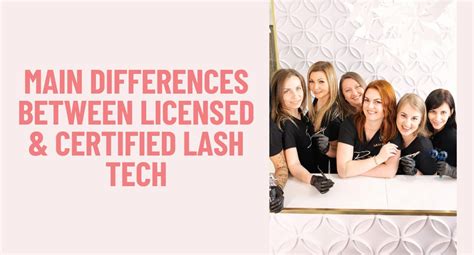As the popularity of eyelash extensions continues to grow, many individuals are considering a career as a lash technician in Pennsylvania. However, before starting this journey, it's essential to understand the difference between being a licensed and certified lash technician in PA.
In this article, we will delve into the world of lash technician licensing and certification in Pennsylvania, exploring the requirements, benefits, and implications of each. Whether you're a seasoned beauty professional or just starting out, this comprehensive guide will help you make informed decisions about your career path.
What is a Licensed Lash Technician in PA?
In Pennsylvania, a licensed lash technician is a professional who has obtained a license from the Pennsylvania State Board of Cosmetology to practice lash extension services. To become a licensed lash technician, you must meet the following requirements:
- Complete a minimum of 300 hours of training in a state-approved cosmetology school
- Pass the written and practical exams administered by the Pennsylvania State Board of Cosmetology
- Obtain a license to practice cosmetology in the state of Pennsylvania
What is a Certified Lash Technician in PA?
A certified lash technician in PA is a professional who has obtained certification from a reputable organization, such as the National Association of Lash Artists (NALA) or the American Association of Cosmetology Schools (AACS). Certification programs typically require:
- Completion of a training program approved by the certifying organization
- Passing a written or practical exam to demonstrate competence
- Meeting ongoing education requirements to maintain certification
Key Differences Between Licensed and Certified Lash Technicians in PA
While both licensed and certified lash technicians in PA can provide high-quality services, there are key differences between the two:
- Licensure is mandatory: In Pennsylvania, licensure is required to practice cosmetology, including lash extensions. Certification, on the other hand, is voluntary.
- Scope of practice: A licensed lash technician in PA can provide a broader range of services, including lash extensions, lash lifts, and lash tinting. A certified lash technician may be limited to providing lash extension services only.
- Education and training: Licensure requires a minimum of 300 hours of training, while certification programs may require less training or experience.
- Certification organizations: There are various certification organizations, each with its own standards and requirements. Licensure, on the other hand, is governed by the Pennsylvania State Board of Cosmetology.

Benefits of Being a Licensed Lash Technician in PA
While licensure requires more education and training, it offers several benefits:
- Increased earning potential: Licensed lash technicians in PA can command higher prices for their services due to their expertise and credentials.
- Broader scope of practice: Licensed lash technicians can provide a wider range of services, increasing their job prospects and opportunities.
- Greater credibility: Licensure demonstrates a commitment to excellence and a higher level of competence, increasing credibility with clients and employers.
Benefits of Being a Certified Lash Technician in PA
Certification also offers several benefits:
- Specialized knowledge: Certification programs focus on specific areas of lash technology, providing specialized knowledge and expertise.
- Increased job prospects: Certification can increase job prospects and opportunities, particularly in salons and spas that require certified technicians.
- Continuing education: Certification programs often require ongoing education, ensuring certified technicians stay up-to-date with the latest techniques and technologies.
How to Become a Licensed Lash Technician in PA
To become a licensed lash technician in PA, follow these steps:
- Meet the age requirement: You must be at least 16 years old to apply for a cosmetology license in PA.
- Complete the required education: Attend a state-approved cosmetology school and complete the required 300 hours of training.
- Pass the written and practical exams: Pass the exams administered by the Pennsylvania State Board of Cosmetology.
- Apply for licensure: Submit an application to the Pennsylvania State Board of Cosmetology and pay the required fees.
- Maintain licensure: Complete ongoing education requirements and renew your license as required.
How to Become a Certified Lash Technician in PA
To become a certified lash technician in PA, follow these steps:
- Choose a certification program: Research and choose a reputable certification program, such as NALA or AACS.
- Meet the education requirements: Complete the required training and education for the certification program.
- Pass the certification exam: Pass the written or practical exam to demonstrate competence.
- Maintain certification: Complete ongoing education requirements and renew your certification as required.




Conclusion
In conclusion, both licensure and certification are essential for lash technicians in PA. While licensure is mandatory, certification provides specialized knowledge and expertise. By understanding the differences between licensed and certified lash technicians, you can make informed decisions about your career path and provide high-quality services to your clients.
We hope this comprehensive guide has provided you with the information you need to succeed as a lash technician in PA. If you have any questions or comments, please don't hesitate to reach out.
FAQ Section
What is the difference between a licensed and certified lash technician in PA?
+A licensed lash technician in PA has obtained a license from the Pennsylvania State Board of Cosmetology, while a certified lash technician has obtained certification from a reputable organization.
Do I need a license to practice lash extensions in PA?
+Yes, you need a license from the Pennsylvania State Board of Cosmetology to practice lash extensions in PA.
How do I become a certified lash technician in PA?
+You can become a certified lash technician in PA by completing a certification program approved by a reputable organization, such as NALA or AACS.
